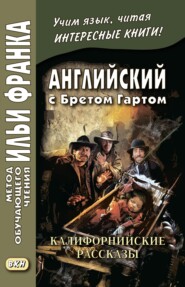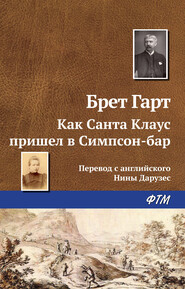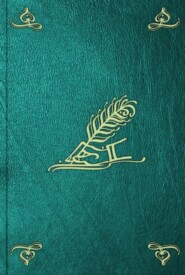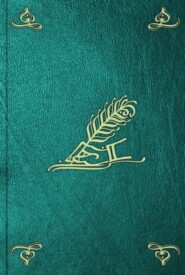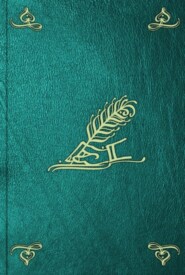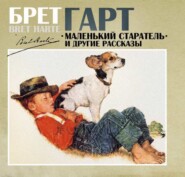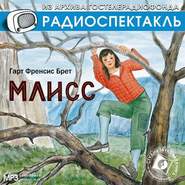По всем вопросам обращайтесь на: info@litportal.ru
(©) 2003-2024.
✖
Gabriel Conroy
Автор
Год написания книги
2017
Настройки чтения
Размер шрифта
Высота строк
Поля
The old woman reappeared with an anxious face and ran towards the sofa. But she was loo late; her mistress had fainted.
CHAPTER VII.
A LEAF OUT OF THE PAST
Arthur's letter to his partners was a brief explanation of his delay, and closed with the following sentence —
"Search the records for any deed or transfer of the grant from Dr. Devarges."
He had scarcely concluded before Diego entered ready for the journey. When he had gone, Arthur waited with some impatience the reappearance of Donna Dolores. To his disappointment, however, only the solemn major-domo strode grimly into the room like a dark-complexioned ghost, and, as it seemed to Arthur, with a strong suggestion of the Commander in "Don Giovanni" in his manner, silently beckoned him to follow to the apartment set aside for his reception. In keeping with the sun-evading instincts of Spanish Californian architecture the room was long, low, and half lighted; the two barred windows on either side of the doorway gave upon the corridor and courtyard below; the opposite wall held only a small narrow, deeply-embrasured loop-hole, through which Arthur could see the vast, glittering, sun-illumined plain beyond. The hard, monotonous, unwinking glare without did not penetrate the monastic gloom of this chamber; even the insane, incessant restlessness of the wind that perpetually beset the bleak walls was unheard and unfelt in the grave, contemplative solitude of this religious cell.
Mingled with this grateful asceticism was the quaint contrast of a peculiar Spanish luxuriousness. In a curtained recess an immense mahogany bedstead displayed a yellow satin coverlet profusely embroidered with pink and purple silk flowers. The borders of the sheets and cases of the satin pillows were deeply edged with the finest lace. Beside the bed and before a large armchair heavy rugs of barbaric colours covered the dark wooden floor, and in front of the deep oven-like hearth lay an immense bear-skin. About the hearth hung an ebony and gold crucifix, and, mingled with a few modern engravings, the usual Catholic saints and martyrs occupied the walls. It struck Arthur's observation oddly that the subjects of the secular engravings were snow landscapes. The Hospice of St. Bernard in winter, a pass in the Austrian Tyrol, the Steppes of Russia, a Norwegian plain, all to Arthur's fancy brought the temperature, of the room down considerably. A small water-colour of an Alpine flower touched him so closely that it might have blossomed from his recollection.
Dinner, which was prefaced by a message from Donna Dolores excusing herself through indisposition, was served in solemn silence. A cousin of the late Don José Salvatierra represented the family, and pervaded the meal with a mild flavour of stale cigaritos and dignified criticism of remote events. Arthur, disappointed at the absence of the Donna, found himself regarding this gentleman with some degree of asperity, and a disposition to resent any reference to his client's business as an unwarrantable impertinence. But when the dinner was over, and he had smoked a cigar on the corridor without further communication with Donna Dolores, he began to be angry with himself for accepting her invitation, and savagely critical of the motives that impelled him to it. He was meditating an early retreat – even a visit to Mrs. Sepulvida – when Manuela entered.
Would Don Arturo grant the Donna his further counsel and presence?
Don Arturo was conscious that his cheek was flushing, and that his counsel at the present moment would not have been eminently remarkable for coolness or judiciousness, but he followed the Indian woman with a slight inclination of the head. They entered the room where he had first met the Donna. She might not have moved from the position she had occupied that morning on the couch, so like was her attitude and manner. As he approached her respectfully, he was conscious of the same fragrance, and the same mysterious magnetism that seemed to leap from her dark eyes, and draw his own resisting and unwilling gaze toward her.
"You will despise me, Don Arturo – you, whose country-women are so strong and active – because I am so little and weak, and, – Mother of God! – so lazy! But I am an invalid, and am not yet quite recovered. But then I am accustomed to it. I have lain here for days, Don Arturo, doing nothing. It is weary-eh? You think? This watching, this waiting! – day after day – always the same!"
There was something so delicately plaintive and tender in the cadence of her speech – a cadence that might, perhaps, have been attributed to the characteristic intonation of the Castilian feminine speech, but which Arthur could not help thinking was peculiar to herself, that at the moment he dared not lift his eyes to her, although he was conscious she was looking at him. But by an impulse of safety he addressed himself to the fan.
"You have been an invalid then – Donna Dolores?"
"A sufferer, Don Arturo."
"Have you ever tried the benefit of change of scene – of habits of life? Your ample means, your freedom from the cares of family or kinship, offer you such opportunities," he continued, still addressing the fan.
But the fan, as if magnetised by his gaze, became coquettishly conscious; fluttered, faltered, drooped, and then languidly folded its wings. Arthur was left helpless.
"Perhaps," said Donna Dolores: "who knows?"
She paused for an instant, and then made a sign to Manuela. The Indian woman rose and left the room.
"I have something to tell you, Don Arturo," she continued, "something I should have told you this morning. It is not too late now. But it is a secret. It is only that I have questioned my right to tell it – not that I have doubted your honour, Don Arturo, that I withheld it then."
Arthur raised his eyes to hers. It was her turn to evade his glance. With her long lashes drooped, she went on —
"It is five years ago, and my father – whom may the Saints assoil – was alive. Came to us then at the Presidio of San Geronimo, a young girl – an American, a stranger and helpless. She had escaped from a lost camp in the snowy mountains where her family and friends were starving. That was the story she told my father. It was a probable one – was it not?"
Arthur bowed his head, but did not reply.
"But the name that she gave was not a true one, as it appeared. My father had sent an Expedicion to relieve these people, and they had found among the dead the person whom this young girl – the stranger – assumed to be. That was their report. The name of the young girl who was found dead and the name of the young girl who came to us was the same. It was Grace Conroy."
Arthur's face did not move a muscle, nor did he once take his eyes from the drooping lids of his companion.
"It was a grave matter – a very grave matter. And it was the more surprising because the young girl had at first given another name – the name of Grace Ashley – which she afterwards explained was the name of the young man who helped her to escape, and whose sister she at first assumed to be. My father was a good man, a kind man – a saint, Don Arturo. It was not for him to know if she were Grace Ashley or Grace Conroy – it was enough for him to know that she was alive, weak, helpless, suffering. Against the advice of his officers, he look her into his own house, into his own family, into his own fatherly heart, to wait until her brother, or this Philip Ashley, should return. He never returned. In six months she was taken ill – very ill – a little child was born – Don Arturo – but in the same moment it died and the mother died – both, you comprehend – both died – in my arms!"
"That was bad," said Arthur, curtly.
"I do not comprehend," said Donna Dolores.
"Pardon. Do not misunderstand me. I say it was bad, for I really believe that this girl, the mysterious stranger, with the alias, was really Grace Conroy."
Donna Dolores raised her eyes and stared at Arthur.
"And why?"
"Because the identification of the bodies by the Expedicion was hurried and imperfect."
"How know you this?"
Arthur arose and drew his chair a little nearer his fair client.
"You have been good enough to intrust me with an important and honourable secret. Let me show my appreciation of that confidence by intrusting you with one equally important. I knew that the identification was imperfect and hurried, because I was present. In the report of the Expedicion you will find the name, if you have not already read it, of Lieutenant Arthur Poinsett. That was myself."
Donna Dolores raised herself to a sitting posture.
"But why did you not tell me this before?"
"Because, first, I believed that you knew that I was Lieutenant Poinsett. Because, secondly, I did not believe that you knew that Arthur Poinsett and Philip Ashley were one and the same person."
"I do not understand," said Donna Dolores slowly, in a hard metallic voice.
"I am Lieutenant Arthur Poinsett, formerly of the army, who, under the assumed name of Philip Ashley, brought Grace Conroy out of Starvation Camp. I am the person who afterwards abandoned her – the father of her child."
He had not the slightest intention of saying this when he first entered the room, but something in his nature, which he had never tried to control, brought it out. He was neither ashamed of it nor apprehensive of its results; but, having said it, leaned back in his chair, proud, self-reliant, and self-sustained. If he had been uttering a moral sentiment he could not have been externally more calm or inwardly less agitated. More than that, there was a certain injured dignity in his manner, as he rose, without giving the speechless and astonished woman before him a chance to recover herself, and said —
"You will be able now to know whether your confidence has been misplaced. You will be able now to determine what you wish done, and whether I am the person best calculated to assist you. I can only say, Donna Dolores, that I am ready to act either as your witness to the identification of the real Grace Conroy, or as your legal adviser, or both. When you have decided which, you shall give me your further commands, or dismiss me. Until then, adios!"
He bowed, waved his hand with a certain grand courtesy, and withdrew. When Donna Dolores raised her stupified head, the door had closed upon him.
When this conceited young gentleman reached his own room, he was, I grieve to say, to some extent mentally, and, if I may use the word, morally exalted by the interview. More than that, he was in better spirits that he had been since his arrival. From his room he strode out into the corridor. If his horse had been saddled, he would have taken a sharp canter over the low hills for exercise, pending the decision of his fair client, but it was the hour of the noonday siesta, and the courtyard was deserted. He walked to the gate, and looked across the plain. A fierce wind held uninterrupted possession of earth and sky. Something of its restlessness, just at that instant, was in Arthur's breast, and, with a glance around the corridor, and a momentary hesitation, as an opening door, in a distant part of the building, suggested the possibility of another summons from Donna Dolores, he stepped beyond the walls.
CHAPTER VIII.
THE BULLS OF THE BLESSED TRINITY
The absolute freedom of illimitable space, the exhilaration of the sparkling sunlight, and the excitement of the opposing wind, which was strong enough to oblige him to exert a certain degree of physical strength to overcome it, so wrought upon Arthur, that in a few moments he had thrown off the mysterious spell which the Rancho of the Blessed Trinity appeared to have cast over his spirits, and had placed a material distance between himself and its gloomy towers. The landscape, which had hitherto seemed monotonous and uninspiring, now became suggestive; in the low dome-shaped hills beyond, that were huddled together like half-blown earth bubbles raised by the fiery breath of some long-dead volcano, he fancied he saw the origin of the mission architecture. In the long sweep of the level plain, he recognised the calm, uneventful life that had left its expression in the patient gravity of the people. In the fierce, restless wind that blew over it – a wind so persistent and perpetual that all umbrage, except a narrow fringe of dwarfed willows defining the line of an extract watercourse, was hidden in sheltered cañons and the lee-ward slopes of the hills – he recognized something of his own restless race, and no longer wondered at the barrenness of the life that was turned towards the invader. "I daresay," he muttered to himself, "somewhere in the lee-ward of these people's natures may exist a luxurious growth that we shall never know. I wonder if the Donna has not" – but here he stopped; angry, and, if the truth must be told, a little frightened at the persistency with which Donna Dolores obtruded herself into his abstract philosophy and sentiment.
Possibly something else caused him for the moment to dismiss her from his mind. During his rapid walk he had noticed, as an accidental, and by no means an essential feature of the bleak landscape, the vast herds of crawling, purposeless cattle. An entirely new and distinct impression was now forming itself in his consciousness – namely, that they no longer were purposeless, vagrant, and wandering, but were actually obeying a certain definite law of attraction, and were moving deliberately toward an equally definite object. And that object was himself!
Look where he would; before, behind, on either side, north, east, south, west, – on the bleak hill-tops, on the slope of the falda, across the dried-up arroyo, there were the same converging lines of slowly moving objects towards a single focus – himself! Although walking briskly, and with a certain definiteness of purpose, he was apparently the only unchanging, fixed, and limited point in the now active landscape. Everything that rose above the dead, barren level was now moving slowly, irresistibly, instinctively, but unmistakably, towards one common centre – himself! Alone and unsupported, he was the helpless, unconscious nucleus of a slowly gathering force, almost immeasurable in its immensity and power!
At first the idea was amusing and grotesque. Then it became picturesque. Then it became something for practical consideration. And then – but no! – with the quick and unerring instincts of a powerful will, he choked down the next consideration before it had time to fasten upon or paralyse his strength. He stopped and turned. The Rancho of the Blessed Trinity was gone! Had it suddenly sank in the earth, or had he diverged from his path? Neither; he had simply walked over the little elevation in the plain beside the arroyo and corral, and had already left the Rancho two miles behind him.
It was not the only surprise that came upon him suddenly like a blow between the eyes. The same mysterious attraction had been operating in his rear, and when he turned to retrace his steps towards the Mission, he faced the staring eyes of a hundred bulls not fifty yards away. As he faced them, the nearest turned, the next rank followed their example, the next the same, and the next, until in the distance he could see the movement repeated with military precision and sequence. With a sense of relief, that he put aside as quickly as he had the sense of fear, he quickened his pace, until the nearest bull ahead broke into a gentle trot, which was communicated line by line to the cattle beyond, until the whole herd before him undulated like a vast monotonous sea. He continued on across the arroyo and past the corral until the blinding and penetrating cloud of dust, raised by the plunging hoofs of the moving mass before him, caused him to stop. A dull reverberation of the plain – a sound that at first might have been attributed to a passing earthquake – now became so distinct that he turned. Not twenty yards behind him rose the advance wall of another vast, tumultuous sea of tossing horns and undulating backs that had been slowly following his retreat! He had forgotten that he was surrounded.







